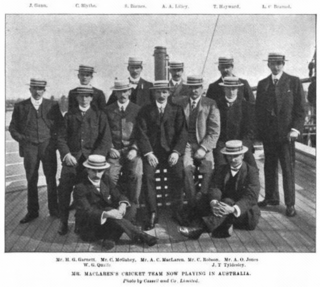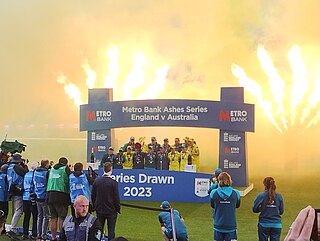An England team toured Australia between November 1920 and March 1921. The tour was organised by the Marylebone Cricket Club and matches outside the Tests were played under the MCC name. The tour itinerary consisted of 13 first-class matches, including a series of 5 Test matches against Australia in which The Ashes were at stake.
Marylebone Cricket Club organised the England cricket team's tour of Australia in the 1924–25 season. Australia won the Ashes series 4–1.
England won the 1926 Ashes series against Australia, winning the last Test of the series after the first four matches were drawn.
Australia won the 1930 Ashes series against England, winning two of the matches and losing one, with the other two tests drawn. The Australian tourists were captained by Bill Woodfull, while the home side were led by Percy Chapman, who was dropped in favour of Bob Wyatt in the final Test.
The England cricket team toured Australia in the 1936–37 season to play a five-match Test series against Australia for The Ashes. The tour was organised by the Marylebone Cricket Club and matches outside the Tests were played under the MCC name.
The Australian cricket team toured England in the 1964 season to play a five-match Test series against England for The Ashes. Australia won the series 1–0 with 4 matches drawn and therefore retained The Ashes.
The Australian cricket team toured England in the 1968 season to play a five-match Test series against England for The Ashes. Australia retained The Ashes after the series was drawn 1-1.
The English cricket team in South Africa in 1913–14 was organised by Marylebone Cricket Club (MCC). The team played as MCC in the non-Test fixtures and as England in the five Test matches. They played 18 first-class matches including the Tests, winning 9 times with 8 draws and 1 defeat.
An England cricket team toured Australia in the 1897–98 season to play a five-match Test series against the Australia national cricket team. The team was captained by Andrew Stoddart and, except in the Test matches when it was called England, it was generally known as A. E. Stoddart's XI. The playing strength of the team was weakened by Stoddart acceding to a request from the Australians to bring “new blood”. As a result, established players including JT Brown, Albert Ward and Bobby Peel were not selected.

The English cricket team in Australia in 1901–02 lost the Test series to Australia, who came from one down to win 4–1 and thus retained The Ashes. The England side was a private venture of Archie MacLaren at the invitation of the Melbourne Cricket Club, after MCC had declined to send a team. Prior to this, all Test tours of Australia had been privately organised, but MCC took over the responsibility with the following tour in 1903–4. George Hirst, Wilfred Rhodes, KS Ranjitsinjhi, Stanley Jackson and CB Fry were all unavailable.

An English cricket team toured Australia in 1911–12. It was led by Plum Warner, but Johnny Douglas took over the captaincy for all five Test matches when Warner fell ill early in the tour. Despite losing the first Test at Sydney, a side which included Jack Hobbs, Frank Woolley, Sydney Barnes and Wilfred Rhodes hit back to win the remaining four Tests. They thus regained The Ashes.
The English cricket team's tour to Australia in 1903–04 was the first time the Marylebone Cricket Club (MCC) took over responsibility for sponsoring and arranging an overseas tour representing England. England had not won the Ashes since the 1896 series in England. The MCC appointed Plum Warner to put together and captain a team, which was very much seen as the underdogs against Australia. Warner and his team, however, pulled off the upset the English were looking for and won the five-Test series 3–2. In the first Test at Sydney, R.E. "Tip" Foster scored 287 to set the world record for the highest individual Test innings; the innings remains the highest by a Test debutant.
The Australian cricket team toured the West Indies in the 1990–91 season to play a five-match Test series against the West Indies.
The England national cricket team toured Ceylon, Australia and New Zealand in the 1929–30 season to play a Test series against the New Zealand national cricket team. This was the first Test series ever played by New Zealand. England began the tour in October 1929 in Ceylon with a single minor match and then in Australia where they played five first-class matches. The New Zealand leg of the tour began in December and, in addition to the Test series, England played each of the main provincial teams: Auckland, Wellington, Canterbury and Otago. England, captained by Harold Gilligan, won the Test series 1–0 with three matches drawn.
A cricket team from England organised by the Marylebone Cricket Club (MCC) toured India from 5 October 1951 to 2 March 1952. During this tour England team also played first class matches in Pakistan and Ceylon. In the Test matches, the side was known as "England"; in other matches, it was known as "MCC".
The Australia National Cricket Team were in England from June to September 2013 for a tour that consisted of five test matches, five One Day International matches and two Twenty20 International matches. The Test series was for The Ashes.
The Australia national cricket team toured England from June to September 2015 for a five-match Test series, five One Day International (ODI) matches and one Twenty20 International (T20I). The Test series was for the Ashes. They also played two four-day and two three-day first-class matches against English county sides. Australia also played one ODI against Ireland in Belfast.
The English women's cricket team toured New Zealand and Australia between November 1957 and March 1958. Against New Zealand they played two Test matches, which were both drawn.
The England women's cricket team toured Australia and New Zealand from January to March 1949, playing three Test matches against Australia, followed by one against New Zealand. The series against Australia was retrospectively recognised as the third series of the Women's Ashes; England entered the series as notional holders of the Ashes, having won the first series in 1934–35, and retained them by drawing the second series, in 1937. Australia claimed their first series victory over England in 1949, winning 1–0, with two drawn matches.

The 2023 Women's Ashes series was a cricket series which took place in England in June and July 2023 as the 2023 edition of the Women's Ashes. For the series, England and Australia faced each other in one Test, three One Day International (ODI) and three Twenty20 International (T20I) matches. The ODI series formed part of the 2022–2025 ICC Women's Championship tournament. A points-based system was used across all three formats of the tour to determine the winner of the Ashes series. The Test match at Trent Bridge was the first ever women's Test in England and second overall to be scheduled for five days of play. Australia were the defending champions, having won the 2021–22 Women's Ashes series 12–4.


